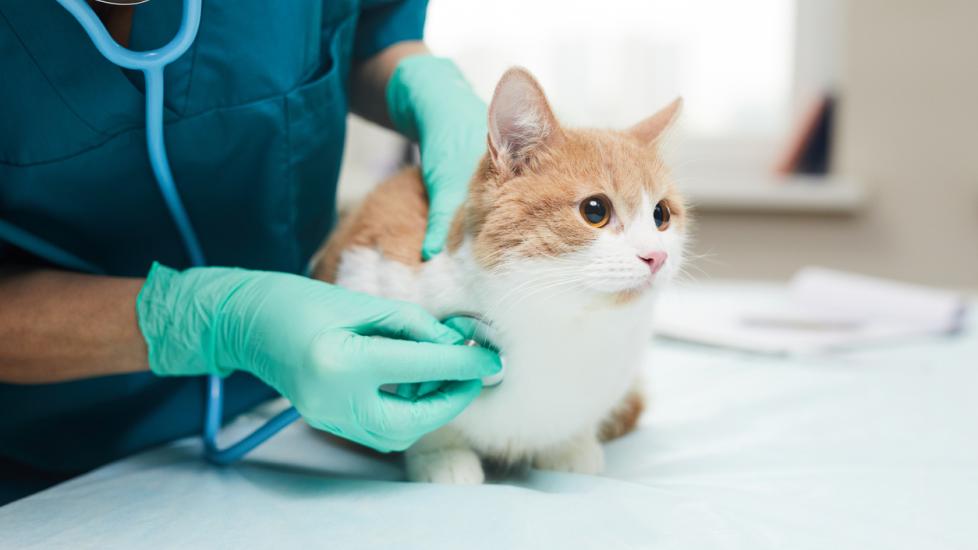Pneumonia in Cats
What Is Pneumonia in Cats?
Lungs play a vital role in the health of all creatures. The lungs of a cat function like those of other mammals by removing used air (carbon dioxide) and supplying the body with fresh oxygen.
Lungs don’t just move air in and out of the body; they also transfer oxygen directly to the bloodstream. Pneumonia occurs when this transfer of oxygen is disrupted.
In a cat with pneumonia, this oxygen disruption occurs because of inflammation and infectious material in the lungs. This causes a physical barrier between the air in the lungs and the bloodstream where the oxygen needs to go.
If your cat is showing any symptoms of pneumonia, it is important to take them to the veterinarian immediately.
Types of Pneumonia in Cats
There are four types of pneumonia in cats:
-
Aspiration pneumonia: This occurs when a cat breathes in a substance that inhibits the transfer of oxygen.
-
Infectious pneumonia: This results from a bacterial and/or viral infection.
-
Fungal pneumonia: This is also called mycotic pneumonia, and is uncommon in cats.
-
Parasitic pneumonia: This is also very uncommon in cats; however, kittens and feral and outdoor cats are known to be prone to this type of pneumonia.
Health Tools
Not sure whether to see a vet?
Symptoms of Pneumonia in Cats
Symptoms of pneumonia may appear slowly or quickly, depending on the type and severity of the infection. Symptoms may include:
-
Fast breathing
-
Difficult breathing
-
Open mouth breathing
-
Increased heart rate
-
Lethargy
-
Lack or loss of appetite
-
Green or yellow nasal discharge
-
Fever
-
Coughing
-
Blue-tinted mucus
Is Pneumonia Contagious to Other Cats?
Certain infectious (viral or bacterial) types of pneumonia can be contagious to other cats, and even dogs, but this is rare.
If your veterinarian suspects a contagious cause of your cat’s pneumonia, it is recommended to separate your sick cat from other pets in your household.
Certain infectious organisms can live on your sick pet’s food, water bowl, litter box, and toys. These items should not be shared between healthy and ill pets and should be washed often. Also, wash your hands after you tend to your sick kitty to prevent the spread of germs.
Causes of Pneumonia in Cats
There are several causes of pneumonia in cats, depending on the type of infection.
Aspiration pneumonia is caused by:
-
Inhalation of vomit/stomach contents, medications, liquids, or other foreign material
-
Weak or inhibited gag reflex or weak esophageal muscles, which may result from megaesophagus, seizures, or recent anesthesia
Infectious pneumonia is caused by:
-
Bacterial infections, which occur most commonly from complications of viral infections or aspiration in cats; pathogens may include Chlamydia trachomatis, mycoplasma, E. coli, and Staphylococcus
-
Viral infections, which may include feline calicivirus, feline viral rhinotracheitis, and feline herpesvirus
-
Co-infection with feline immunodeficiency virus and feline leukemia virus, which has been shown to make cats prone to other infectious pneumonia types
Fungal pneumonia:
- Cryptococcosis is the most common fungal infection in cats and these fungal spores are breathed in, most often from contaminated soil
Parasitic pneumonia is caused by:
- Two species of lung worms: Aelurostrongylus abstrusus and Troglostrongylus brevior. These affect kittens and outdoor and feral cats exposed to the worm larvae in infected water or prey species
How Veterinarians Diagnose Pneumonia in Cats
Your veterinarian may suspect your cat has pneumonia after discussing their history and symptoms with you. During your cat’s physical exam, your vet may do the following:
-
Listen to the lungs for any labored breathing
-
Order chest x-rays to inspect the lungs
-
Order a blood test to check red and white blood cell levels, glucose level, and electrolyte and organ function. Elevated levels of white blood cells usually indicate an infection.
-
Order an upper respiratory panel to test for viruses and bacteria that commonly cause pneumonia
-
Take a fluid culture from your cat’s trachea or nasal passage to test for type of bacteria and how best to treat it
Treatment of Pneumonia in Cats
Treatment for pneumonia depends greatly on its type and the severity of symptoms.
Certain viral pneumonia may be treated on an outpatient basis with supportive care if your cat is otherwise doing well.
Aspiration pneumonia and infectious pneumonia are generally treated with broad-spectrum antibiotics.
If your cat shows moderate to severe symptoms, they may need to be hospitalized.
Additional treatments may include supportive care such as intravenous (IV) fluid therapy, nebulization to keep airways moist, supplemental oxygen, and nutrition therapy through a feeding tube.
If other infectious agents are present, antifungals or other medications may be needed.
Recovery and Management of Pneumonia in Cats
Many cats with aspiration and bacterial pneumonia require 1-3 days of hospitalization, as they might require supplemental oxygen.
Antibiotics may be prescribed to your cat for a minimum of 14 days. Viral infections may clear up on their own in 1-2 weeks but may lead to secondary bacterial infections, so close monitoring at home is important.
Most cats do not have any lingering lung problems once they have fully recovered. Certain cats with underlying disease may be susceptible to a recurrence of pneumonia.
References
-
Dear JD. https://pubmed.ncbi.nlm.nih.gov/31813555/. Veterinary Clinics of North America: Small Animal Practice. 2020;50(2):447-465.
-
Hawley MM, Johnson LR, Traversa D, Bucy D, Vernau KM, Vernau W. Respiratory distress associated with lungworm infection in a kitten. Journal of Feline Medicine and Surgery Open Reports. 2016;2(2).
-
Levy N, Ballegeer E, Koenigshof A. Clinical and radiographic findings in cats with aspiration pneumonia: retrospective evaluation of 28 cases. Journal of Small Animal Practice. 2019;60(6):356-360.
Featured Image: iStock.com/AnnaStills
